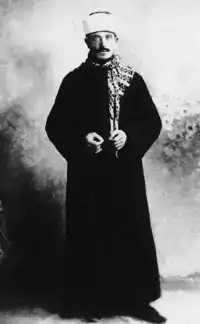Süleyman Askerî
Süleyman Askerî Bey, also known as Suleyman Askeri, Sulayman Askari, Sulaiman al-Askari (Adyghe: Сулейман Аскэрбий, romanized: Suleyman Askərbiy; Turkish: Süleyman Askeri) and unofficially known as Suleyman Askeri Pasha[2] (1884 – 14 April 1915), was a military officer who served in the Ottoman Army. Askerî was of Circassian descent and co founder of the Teşkilât-ı Mahsusa (Special Organisation), a group involved in guerilla warfare.[3]
Süleyman Askerî Bey[1] | |
|---|---|
 | |
| Born | 1884 Prizren, Kosovo Vilayet, Ottoman Empire |
| Died | 14 April 1915 (aged 30–31) Berjisiya, Basra Vilayet, Ottoman Empire |
| Allegiance | |
| Years of service | 1902–1915 |
| Rank | Kaymakam |
| Commands held | Chief of staff of the Bingazi Area Command (Aziz Ali), Staff officer of the X Corps, Chief of Staff of Trabzon Redif Division, Chief of the Special Organization, Commander of the Iraq Area Command (Governor of Basra Vilayet) |
| Battles/wars | Italo-Turkish War Balkan Wars First World War |
| Other work | Chief of the General Staff of the Provisional Government of Western Thrace |
Life
Süleyman Askerî was born to General Vehbi Pasha, who served as military staff at Edirne in 1898 and then in Anatolia,[4] in 1884 in Prizren. He graduated from the Ottoman Military Academy in 1902 and graduated from the Ottoman Military College on 5 November 1905 as Distinguished Captain (Mümtaz Yüzbaşı ).
He was assigned to Monastir (present-day Bitola) under the command of the Third Army stationed at Salonica (present-day Thessaloniki). During the days he stayed in Monastir, he joined the Committee of Union and Progress and he married Fadime Hanım, who was an aristocrat of Filibe (present-day Plovdiv). They had two daughters, Fatma and Dilek. During the Young Turk Revolution (1908), First Lieutenant Atıf Kamçıl stated that he asked the CUP Monastir branch for a gun and had talks with Süleyman Askerî, the branch's guide about the assassination of Shemsi Pasha.[5] Askerî was closest friend of Kuşçubaşzade Eşref (Sencer). According to Philip Hendrick Stoddard, he was a brother-in-law of Mehmed Nuri (Conker),[6] who was the oldest friend of Mustafa Kemal (Atatürk).[7]
In 1909, he was promoted to the rank of Kolağası and appointed to the gendarmerie regiment in Baghdad. In 1911, after the Kingdom of Italy invaded the vilayet of Tripoli (present-day Libya), he went there and participated in operations in Benghazi. In 1912, he took part in the Balkan Wars as the chief of staff of Trabzon Redif Division[8] and then became the Chief of the General Staff of the provisional government (31 August 1913 – 25 October 1913) established in Western Thrace.[9] On 13 November 1913, he was appointed to the chief of the Ottoman Special Organisation when it was officially formed.[10]
He took his own life in 1915 during a series of devastating Ottoman military defeats, in the middle of a British Ambush on the outskirts of Kut, Iraq.[11]
Sources
- T.C. Genelkurmay Harp Tarihi Başkanlığı Yayınları, Türk İstiklâl Harbine Katılan Tümen ve Daha Üst Kademelerdeki Komutanların Biyografileri, Genkurmay Başkanlığı Basımevi, Ankara, 1972, p. 18. (in Turkish)
- Şevket Süreyya Aydemir, Makedonyaʾdan Orta Asyaʾya Enver Paşa: cilt III: 1914-1922, Remzi kitabevi, p. 192. (in Turkish)
- Gingeras, Ryan (2009). Sorrowful Shores: Violence, Ethnicity, and the End of the Ottoman Empire 1912-1923. Oxford: Oxford University Press. pp. 58, 180. ISBN 9780199561520.
- Celâl Bayar, Ben de Yazdım: Millî Mücadeleʼye Gidiş, Baha Matbaası, 1965, p. 1289. (in Turkish)
- Hanioğlu, M. Șükrü (2001). Preparation for a Revolution: The Young Turks, 1902-1908. Oxford University Press. p. 472. ISBN 9780199771110.
- The Ottoman Government and the Arabs, 1911 to 1918: A Preliminary Study of the Teskilât-ı Mahsusa, Princeton University, 1963, p. 175.
- Erik Jan Zürcher, The Unionist Factor: The Role of the Committee of Union and Progress in the Turkish National Movement, 1905-1926, BRILL, 1984, ISBN 978-90-04-07262-6, p. 48.
- Fuat Balkan, Turgut Gürer (ed.), Komitacı: BJK'nin kurucusu Fuat Balkan'ın anıları, Gürer Yayınları, 2008, ISBN 978-9944-0-8102-3, p. 42. (in Turkish)
- Стайко Трифонов, Тракия. «Административна уредба, политически и стопански живот, 1912-1915», Глава II. Административна уредба и управление на Западна Тракия. (in Bulgarian)
- Erdal İlter, Kuruluşunun 75. Yılı Anısına Millî İstihbarat Tarihçesi, Millî Emniyet Hizmetleri Riyâseti (M.E.H)/(MAH), (1927/1965), Millî İstihbarat Teşkilât Müsteşarlığı, Ankara, 2002, ISBN 975-19-2712-9, Enver Paşa ve Teşkilâtı Mahsûsa (1913-1918). (in Turkish)
- Rogan, Eugene (2015). The Fall of The Ottomans. Basic Books. p. 301. ISBN 978-0-465-05669-9.
External links
- Fortna, Benjamin C.: Askerî Bey, Süleymân, in: 1914-1918-online. International Encyclopedia of the First World War.